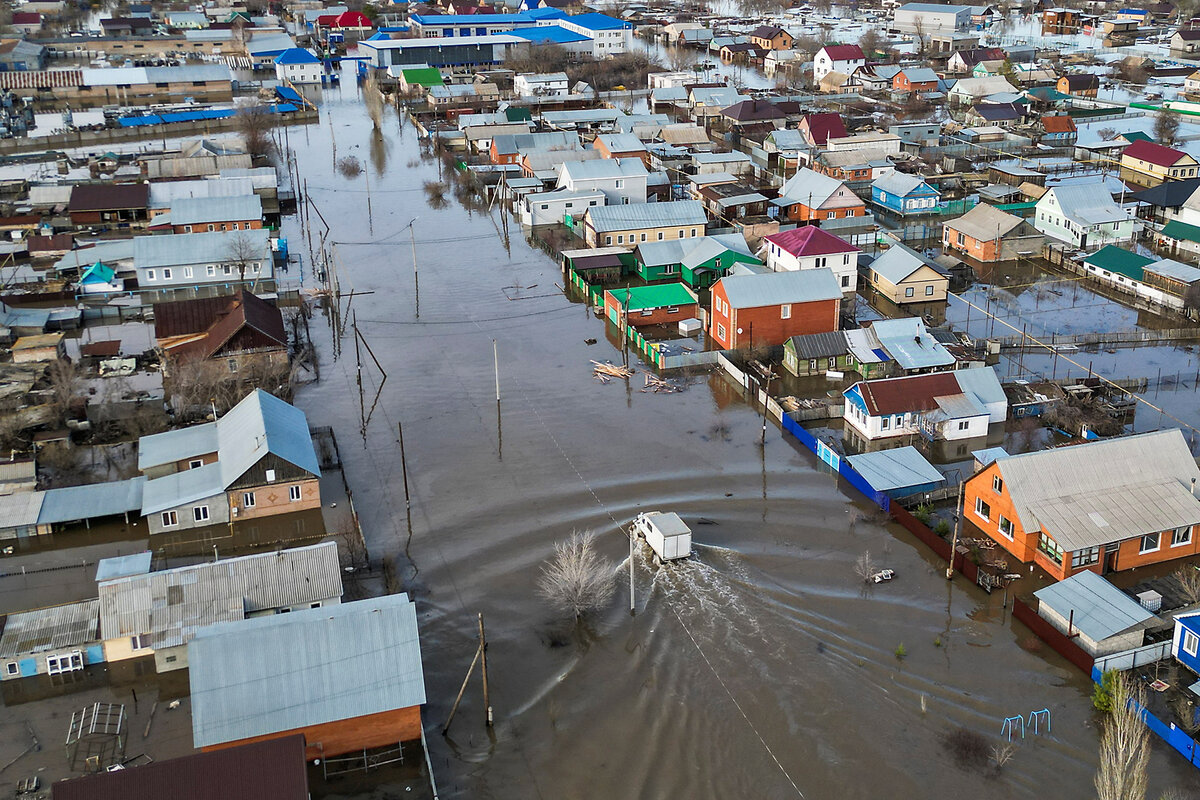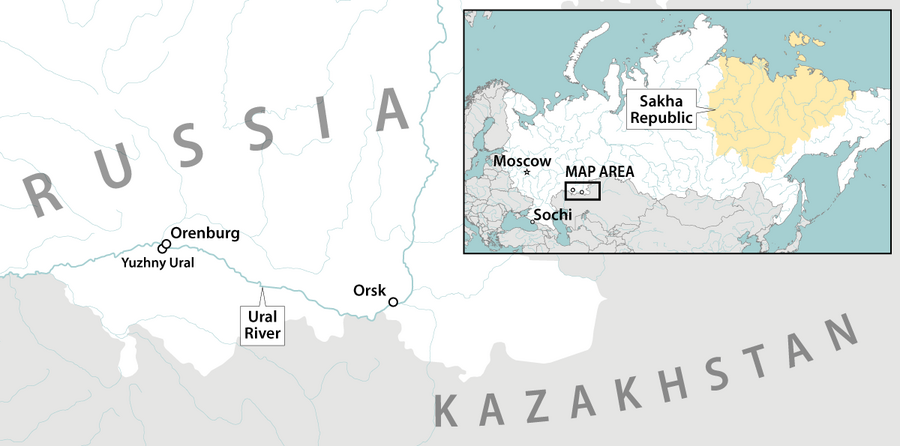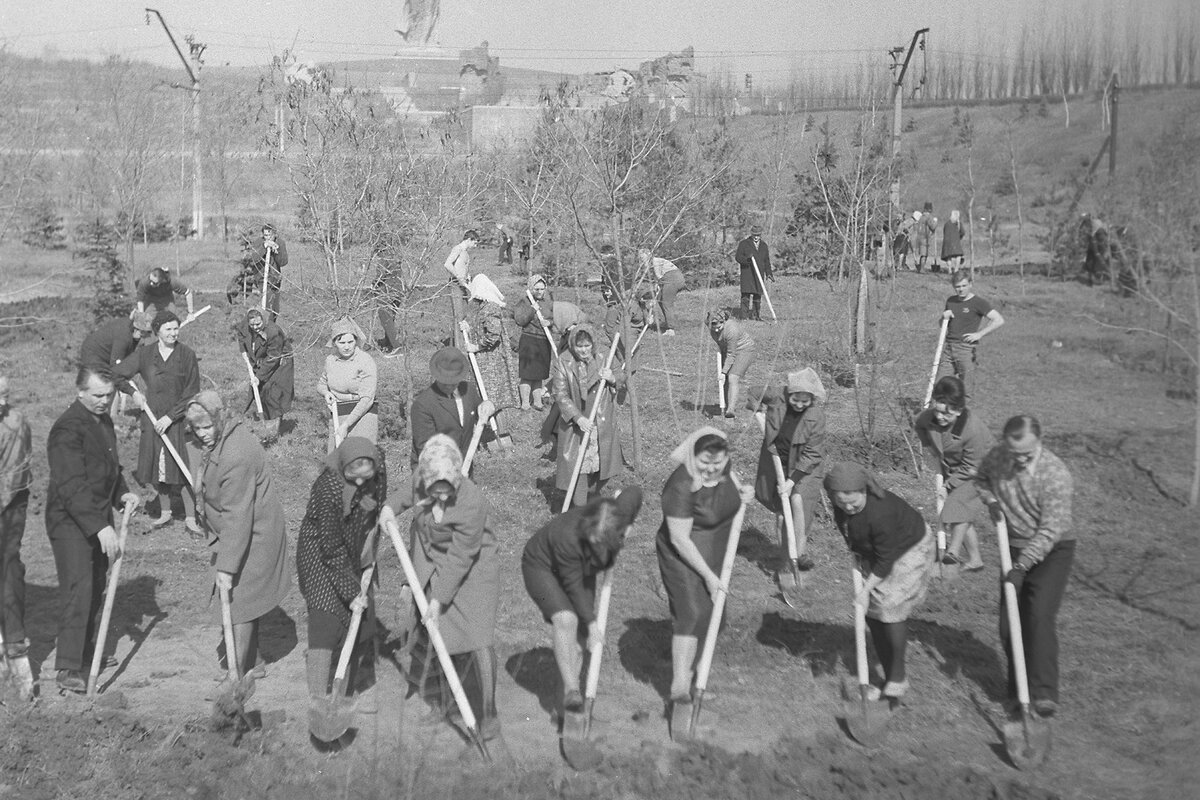The Soviets stifled volunteerism in Russia. Torrential flooding may be reviving it.
Loading...
| Moscow
When the banks of the Ural River in eastern Russia overflowed early this spring, creating catastrophic flooding unseen in a generation across the city of Orenburg and driving thousands from their homes, Antonina Golysheva, a local kindergarten teacher, sprang into action.
“Parts of my settlement were flooded, and some of my own neighbors were in dire conditions,” she said by phone from her village, Yuzhny Ural. “I have a small car, so I went out and found people who needed help. I carried their belongings, their pets, their children, and transported them to local shelters.”
After a Ural River dam burst in mid-April, almost completely submerging the city of Orsk, the Kremlin declared a state of emergency in the region. The massive floods swept across 36 regions of central Russia and Siberia this spring and are still ongoing in the far-northeastern Russian Republic of Sakha, aka Yakutia, destroying thousands of homes and forcing the evacuation of tens of thousands of people.
Why We Wrote This
A story focused onThe idea of volunteers organizing to help in a crisis is nothing new in the West. But when it happened amid recent massive flooding in Russia, it was a surprise, bucking against decades of Soviet-induced cynicism.
But one aspect of the crisis that hasn’t received much coverage, even in the Russian media, is the outpouring of public efforts to help those affected by the floods – a relatively new and unexpected phenomenon in Russia. Telegram channels are full of accounts of people raising money, collecting warm clothes and food, and, in the regions themselves, rushing to the scene with cars, boats, and even diving equipment.
“Most people in my circle, if they didn’t need assistance themselves, were out there trying to help,” says Ms. Golysheva. “We coordinated among ourselves. There were representatives of the state working there as well, but we were just ordinary people doing what we could.”
“Our volunteers pulled people and pets out of flooded buildings, found temporary accommodation and hot meals for people in a difficult situation,” says Yelena Suchsheva, regional coordinator of the private charity Golden Hands of an Angel, reached by telephone in Orenburg. “We work side by side with state organizations, such as the ministry of emergency services, local police, and medical services. They do their jobs, and we help them by doing ours. Sometimes we take part of their work on ourselves.”
Restoring a charitable mindset
The rapid growth of popular volunteerism, whether independent or in league with the state, runs counter to Soviet history. The former system ran all kinds of compulsory “volunteer” activities, under tight Communist Party control, and would never tolerate any sort of independent or spontaneous initiatives.
Instead, it was common to see people laboring in regular subbotnik events, basically weekend days of unpaid volunteer work. Residents would come out to clean up their apartment grounds or repair facilities under the watchful eye of the local party secretary, or students would provide free labor on construction sites as part of their studies. The Soviet experience left a legacy of resentment and cynicism that was rather inimical to genuine public spirited involvement.
The Kremlin began cultivating the potential for volunteer activity to supplement state endeavors around the time of the Sochi Olympics a decade ago. It spent vast sums not only on preparing for the Games, but also on remaking Sochi’s infrastructure and on implementing various forms of social engineering designed to involve the public more closely with the state’s objectives.
Around 25,000 young people from around the country were recruited to perform a wide variety of auxiliary functions at the Games that might normally be filled by paid staff. The same formula was repeated for the 2018 FIFA World Cup in several cities across Russia.
The state has since encouraged the growth of a permanent volunteer movement, #MyVmeste (meaning “we are together”), whose activities track closely with official patriotic and national goals. But unlike in Soviet times, the volunteer energy appears real, and the spontaneous involvement of citizens like Ms. Golysheva is easily accepted.
According to Denis Volkov, director of the Levada Center, Russia’s only independent public opinion agency, the participation rate in private charity activities has been steadily rising, and has tripled among young people from around 3% to almost 10% in the past few years. As many as 50% of Russians regularly donate money or clothing for people in need, bringing their contributions to collection points that are usually run by the Russian Orthodox Church. Over the past two years, the government has actively encouraged the population to participate in collecting aid for front-line troops fighting in the Ukraine war.
“The state offered incentives, and sometimes a kind of coerced volunteering in state institutions and educational establishments. The state created its own network to collect aid,” he says. “Statistical data shows a considerable growth in citizens’ participation.”
The limits of the system
When it comes to natural disasters such as floods and wildfires, volunteers are now an integral part of all stages of relief efforts.
“In an emergency situation, these volunteers cannot work in an absolutely autonomous way, separate from state institutions,” says Olga Basheva, an expert with the official Institute of Sociology in Moscow. “There is a synergy in play, a kind of civil-state partnership.” She says these efforts started as free civil initiatives from the grassroots but have evolved into an integrated system that supplements, and sometimes improves on, state responses.
Experts agree that the expanding list of formerly state-run services that now feature major volunteer involvement only includes activities of which the Kremlin approves. Given the degree to which the state has co-opted the movement – albeit with lavish support, praise, and rewards – there seems little danger of volunteer energies veering into officially unwelcome political directions.
Critics say the growth of volunteerism in Russia is all very well, but it cannot be seen as a substitute for strong and independent civil society organizations that can actually influence state policies and behavior.
Most big, internationally connected groups have been labeled “foreign agents” and forced to shut down in Russia over the past decade. Their absence amid the current flooding crisis is glaring, say experts, as Russian media describe the emergency as a wake-up call about the creeping threat of global warming and the inadequacy of local flood-control infrastructure.
“With the intentional disabling by the Russian government of large [nongovernmental organizations] such as the WWF [World Wildlife Fund] and Greenpeace, there are no longer any actors who would examine and lobby for better flood management practices between catastrophic events,” says Yevgeny Simonov, a Russian environmental activist now living in exile.
“Civil society needs to push for reform of outdated flood management policies before disasters happen, but in present-day wartime Russia, there is little capacity for that.”
Editor’s note: The story was updated to correct the description of Mr. Simonov’s background as an activist.









